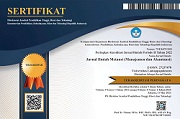Analisis Pelaksanaan Program FMD Rumah Tahanan Negara Kelas IIa Yogyakarta
Abstract
This study aims to analyze the implementation of the FMD Program (Physical, Mental, and Discipline Development) as part of capacity building at the Class IIA Yogyakarta Detention Center. The FMD Program is intended to enhance employee discipline, work enthusiasm, and team cohesion. However, the findings reveal unequal participation, a predominance of recreational activities, and a limited impact on improving employee discipline. This research employs a qualitative descriptive method using the Collaborative Governance Regime (CGR) approach, which includes four dimensions: system dynamics, principled engagement, shared motivation, and capacity for joint action. The study's results indicate that the FMD Program has not been fully adaptive to environmental changes, lacks formal and systematic evaluation, and shows weak internalization of discipline values among employees. Although the program is supported by budget and facilities, the absence of regulatory instruments—such as implementation guidelines and technical instructions—has led to a lack of clear and measurable direction in its execution.A reformulation of the FMD concept is necessary to shift its orientation beyond recreation and toward fostering sustainable behavioral change among staff.
References
B. Miles, Matthew; Hubberman, A. M. (1994). Qualitative Data Analysis: An Expanded Sourcebook : Sage Publication.
Creswell, J. W. (2012). Educational Research: Planning, Conducting, and Evaluating Quantitative and Qualitative Research (4th ed.) : Pearson.
Eade, D. (1997). Capacity-building: An Approach to People-centred Developmen (1st ed.) : Oxfam UK and Ireland 1997.
Emerson, Kirk; Nabatchi, T. (2015). Collaborative Governance Regimes. Georgetown University Press.
Grindle, M. (1997). Getting Good Government: Capacity Building in the Public Sectors of Developing Countries : Harvard Institute for International Development, Harvard University, 1997.
R. Kothari, C. (2004). Research Methodology: Methods and Techniques (2nd ed.). New Age International.
Sidiq, Umar; Choiri, M. M. (2019). Metode Kualitatif di Bidang Pendidikan (A. Mujahidin (ed.); 1st ed.). CV. Nata Karya.
Sutrisno, E. (2010). Budaya Organisasi (1st ed.). Prenada Media Group.
Sutrisno, E. (2023). Manajemen Sumber Daya Manusia. In Edisi Revisi Jakarta: Bumi Aksara (9th ed., Issue 1). Kencana Publisher.
W. Creswell, J. (2014). Research Design: Qualitative, Quantitative, and Mixed Methods Approaches (Bauhaus, B). Sage Publications.
Karya Ilmiah
Bahmim, S. (2023). Pelatihan Penerapan Perilaku Adaptif PNS Dalam Menghadapi Era Globalisasi. COMMUNITY : Jurnal Pengabdian Kepada Masyarakat, 2(2), 107–114. https://doi.org/10.51878/community.v2i2.1917
Chanyalew, M. A., Yitayal, M., Atnafu, A., Mengiste, S. A., & Tilahun, B. (2022). The Effectiveness of the Capacity Building and Mentorship Program in Improving Evidence-Based Decision-making in the Amhara Region, Northwest Ethiopia: Difference-in-Differences Study. JMIR Medical Informatics, 10(4). https://doi.org/10.2196/30518
Grindle, M. (1997). Getting Good Government: Capacity Building in the Public Sectors of Developing Countries. Harvard Institute for International Development, Harvard University, 1997.
Keynejad, R. C., Bentley, A., Bhatia, U., Nalwadda, O., Mekonnen, F. D., Ali, P. A., & McGarry, J. (2023). Research, education and capacity building priorities for violence, abuse and mental health in low- and middle-income countries: an international qualitative survey. Social Psychiatry and Psychiatric Epidemiology, 58(12), 1761–1771. https://doi.org/10.1007/s00127-021-02061-5
Mahanum, M. (2021). Tinjauan Kepustakaan. ALACRITY : Journal of Education, 1(2), 1–12. https://doi.org/10.52121/alacrity.v1i2.20
Nugraha. (2004). Pengembangan Kapasitas (Capacity Building) dalam Mendukung Pelaksanaan Otonomi Daerah. Jurnal Ilmu Administrasi, 1(3), 1–10. http://180.250.247.102/index.php/jia/article/view/334%0Ahttp://jia.stialanbandung.ac.id/index.php/jia/article/view/334
Nuraisyah, N., & Haryono, D. (2023). Capacity Building Kelembagaan Badan Usaha Milik Desa (Bumdes) Di Kabupaten Sigi. JPPI (Jurnal Penelitian Pendidikan Indonesia), 9(1), 513–522. https://doi.org/10.29210/020221985
Nurdin, M., & Baharuddin, T. (2023). Capacity Building Challenges and Strategies in the Development of New Capital City of Indonesia. Jurnal Bina Praja, 15(2), 221–232. https://doi.org/10.21787/jbp.15.2023.221-232
Pahira, S. H., & Rinaldy, R. (2023). Pentingnya Manajemen Sumber Daya Manusia (MSDM) Dalam Meningkatkan Kinerja Organisasi. COMSERVA : Jurnal Penelitian Dan Pengabdian Masyarakat, 3(03), 810–817. https://doi.org/10.59141/comserva.v3i03.882
Putra, Yusuf ; Fitriana, M., & Sundari, C. (2024). Capacity Building Karyawan dalam Bidang Manajemen, Promosi dan Desain Interior pada Kasuari Resort. Jurnal Kabar Masyarakat, 2, 9. https://doi.org/https://doi.org/10.54066/jkb.v2i2.1821
R. Kothari, C. (2004). Research Methodology: Methods and Techniques (2nd ed.). New Age International.
Rahman, F. A., Jaelani, J., & Suharyat, Y. (2024). Strategi Pengembangan Sumber Daya Manusia Dalam Disrupsi Teknologi Informasi. NUSRA: Jurnal Penelitian Dan Ilmu Pendidikan, 5(1), 61–70. https://doi.org/10.55681/nusra.v5i1.1851
Setyorini, E. (2022). Efektivitas Capacity Building Dalam Meningkatkan Kinerja Pegawai Pppptk Penjas Dan Bk. TEACHER : Jurnal Inovasi Karya Ilmiah Guru, 2(1), 7–14. https://doi.org/10.51878/teacher.v2i1.996
Sidiq, Umar; Choiri, M. M. (2019). Metode Kualitatif di Bidang Pendidikan (A. Mujahidin (ed.); 1st ed.). CV. Nata Karya.
Snyder, H. (2019). Literature review as a research methodology: An overview and guidelines. Journal of Business Research, 104(March), 333–339. https://doi.org/10.1016/j.jbusres.2019.07.039
Tjahjono, A., Sasongko, P., & Kundala, M. M. (2023). Evaluasi Kinerja Pegawai Rumah Tahanan Negara Kelas II A Yogyakarta Berdasarkan Peraturan Pemerintah Nomor 46 Tahun 2011. Jurnal Riset Akuntansi Dan Bisnis Indonesia, 3(2), 539–556. https://doi.org/10.32477/jrabi.v3i2.722
W. Creswell, J. (2014). Research Design: Qualitative, Quantitative, and Mixed Methods Approaches (Bauhaus, B). Sage Publications.
Warner, K. S. R., & Wäger, M. (2019). Building dynamic capabilities for digital transformation: An ongoing process of strategic renewal. Long Range Planning, 52(3), 326–349. https://doi.org/10.1016/j.lrp.2018.12.001
Warsito; Yuwono, T. (2003). Otnomi Daerah: Capacity Building dan Penguatan Demokrasi Lokal. Puskodak UNDIP.
Peraturan
Undang – Undang Republik Indonesia Nomor 43 Tahun 1999 perubahan atas Undang – Undang Nomor 8 Tahun 1974 Tentang Pokok – Pokok Kepegwaian
Undang – Undang Nomor 46 Tahun 2011 Tentang Penilaian Prestasi Kerja Pegawai Negeri Sipil
Undang – Undang Nomor 22 Tahun 2022 Tentang Pemasyarakatan
Peraturan Presiden No. 81 Tahun 2010 Tentang Grand Design Reformasi Birokrasi 2010 – 2025
Peraturan Lembaga Administrasi Negara Nomor 10 Tahun 2018 Tentang Pengembangan Kompetensi Pegawai Negeri Sipil
Peraturan Pemerintah Nomor 17 Tahun 2020 perubahan atas Peraturan Pemerintah Nomor 11 Tahun 2017 Tentang Manajemen Pegawai Negeri Sipil
Peraturan Pemerintah Nomor 94 Tahun 2021 Tentang Disiplin Pegawai Negeri Sipil
Laporan
Laporan In House Training Pembinaan Fisik, Mental, dan Disiplin pada Rutan Kelas II A Yogyakarta














